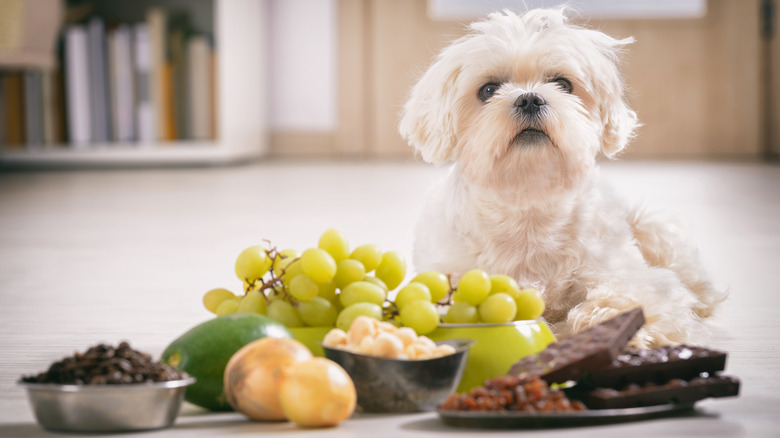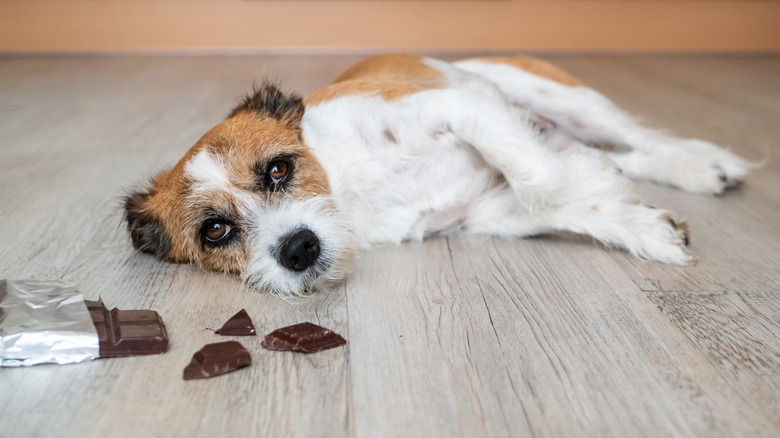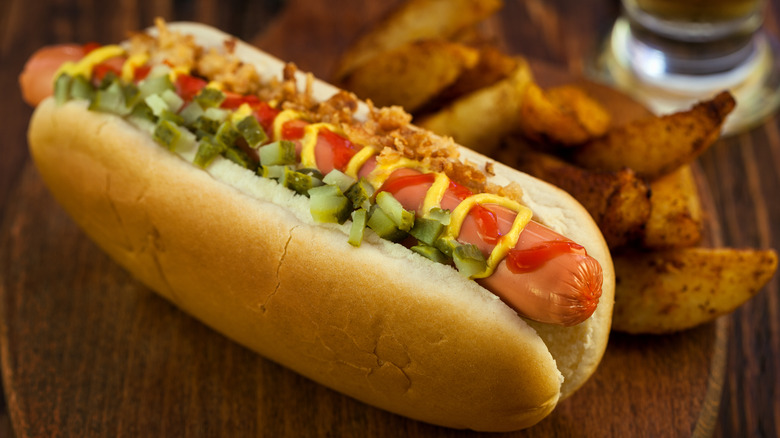These Cookout Foods Are A No-No For Your Pets, According To The ASPCA
For many people, summertime means picnics, cookouts, and other opportunities to whet your appetite. But that shouldn't be the case for your pet. There are many foods that pose certain risks to dogs and cats, per the Humane Society. In some cases, eating a dangerous food could just cause your pet to vomit or have diarrhea, but in other cases, it could result in something far more serious. The symptoms ultimately depend on your pet's weight, what they ate, and how much of it they ate.
So, does that mean your four-legged friend can't enjoy the cookout at all? No! There are plenty of "people foods" you can safely feed your pet, including apples, cooked and unseasoned chicken and pork, and watermelon, per Medical News Today. Just make sure they don't contain any of the toxic foods/ingredients pets shouldn't eat.
Here are a few of the foods you shouldn't feed your pet, according to the ASPCA.
Grapes, raisins, and avocados
Grapes contain tartaric acid, which is the ingredient that makes this fruit poisonous to pets (per the AAHA), causing them to become ill if they eat enough of it. And because raisins are dried grapes, the same dangers apply to them.
If your pet ingests grapes or raisins and becomes poisoned, symptoms can range from vomiting to diarrhea to excessive thirst or even kidney failure. So, if these foods will be part of the party fruit bowl, be sure to keep the bowl in a place that's inaccessible to your pet.
Another no-no food for your canine or feline friend is avocado. This fruit contains a fungicidal toxin called persin, which is safe for humans, but not dogs or cats. It poses a risk to birds and certain large animals, too. In large amounts, ingestion could cause diarrhea, vomiting, or heart attack. Whether you'll be making a guacamole recipe or adding some avocado slices to your burger, it's best not to share any with your pet.
Chocolate and nuts
Will chocolate chip cookies be making an appearance at your next cookout? Or perhaps you're planning to host a weekend bonfire with s'mores. If you plan to have chocolate in any form for your guests to enjoy, keep it away from your feline or canine companion. Chocolate contains a chemical called theobromine, which is toxic to dogs and cats, per the Pet Poison Helpline. The darker the chocolate, the higher the amount of theobromine.
Wondering what would happen if your pet were to accidentally eat too much chocolate? According to VCA Animal Hospitals, "The most common clinical signs are vomiting, diarrhea, increased thirst, panting or restlessness, excessive urination, and racing heart rate. In severe cases, symptoms can include muscle tremors, seizures, and heart failure."
Even certain nuts, such as macadamia nuts and black walnuts, can be dangerous for pets. Toxicity symptoms include vomiting, muscle tremors, and seizures, per PetMD.
Hot dogs and onions
We know, we know. You probably read that header and gasped because you've already fed your dog several hotdog bits during their lifetime. Don't worry. Unlike the aforementioned foods, hotdogs are not toxic to pets. But they can still be dangerous, per the American Kennel Club. As a highly processed food that's usually loaded with large amounts of salt and fat, hotdogs can upset your pup's (or cat's) stomach, leading to vomiting and diarrhea. They can also pose a choking hazard for dogs that attempt to swallow them whole without chewing them.
Do you like onions on your hotdog during cookouts? Or maybe you'll be chopping some up to add that bowl of guac mentioned earlier. Regardless of the food complement, avoid giving onions to your dog or cat. Per a study published in the journal Interdisciplinary Toxicology in 2009, onions contain a toxic compound called N-propyl disulfide, which can lead to anemia in dogs and cats. A tiny bit of onion probably won't hurt your pet, but a large amount can be fatal.
Those puppy dog eyes may be hard to resist, but you should always do your research before giving your pet scraps. While some foods may be harmless in small amounts, others should be completely avoided altogether.



